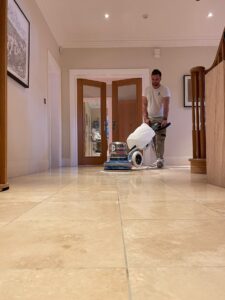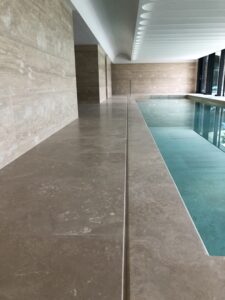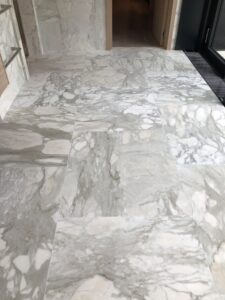The Finer Detail of Interior Stone: Natural Stone Care
This week, as part of our Finer Details of Stone Interiors, guest blogger Becca Cranfield from Athena Stonecare explains why understanding the nature of stone will ensure your natural stone interior remains in top condition.
The beauty of marble, limestone and all natural stones is that they are durable. Created over millions of years, they can certainly stand the test of time. Many of the properties that make the stone so beautiful also give cause to specific care. Whether your client enjoys the patina that develops on the surface of the stone through use, or is a perfectionist, it is important to advise on the correct cleaning regime from the moment the stone is installed. The better cared for the stone, the longer it can elegantly endure.
Day-to-day natural stone care

Using a specialist stone care company will keep a natural stone floor looking its best.
Marble and limestone are both soft stones. The measurement on the MOHs hardness scale is usually between 2-3. To put this into context, diamond is a 10 on the scale and talc is measured at 0. For this reason it is essential to keep stone floors free from scratch hazards. Good quality matting at the property entrances will pick up a lot of the dirt, sand and small stones which can scratch floors.
Daily maintenance is the best way to keep on top of any particles that do find their way into the home. Sweeping is not only quicker than vacuuming, but also much kinder to stone. A daily sweep will remove a lot of the small particulates which can scratch and dull stone floors.
The pH of Natural Stone

Take advice form a stonemason to choose the right stone for its context.
Limestone is a sedimentary rock usually formed in shallow water where the skeletons of organisms settle. The patterns you can see scattered throughout limestone are the fossilised remains of this debris. Made primarily of calcium carbonate, Limestone can also contain minerals such as iron oxide, feldspar and clay, which accounts for the array of colours that you’ll see when selecting limestone for your home. Marble actually starts life as limestone and is classed as a metamorphic rock. This means that through high heat and pressure, the structure of the limestone is transformed into the elegant veined stone we see today as marble.
The nature of this formation means marble and limestone are highly alkaline with a calcium carbonate base, making them very sensitive to acids. Any contact will create a chemical reaction. Known as an ‘etch mark’ this will usually show up as a dull or white patch on the stone.
Living with a Natural Stone Interior

A skilled stonemason can advise on post-installation care as well as ensuring natural stone is properly prepared and sealed during the production process.
In the context of your home, this means that you should take care to avoid highly acidic food, drinks and cleaning products coming into contact with your limestone and marble surfaces.
It is important to only ever use a pH neutral cleaning detergent. Many common household cleaners are acidic and will damage stone. On the other hand, heavy duty cleaning concentrates are often alkaline in make-up. They work very well to remove dirt, however will react with the stone sealant. This can make the floor more porous and susceptible to staining and dirt ingress.
Becca Cranfield is Director at Athena Stonecare and is a guest blogger for AF Jones Stone Interiors.
For more on the cleaning and maintenance of Interior stone visit www.athenastonarecare.co.uk or for a PDF version of Athena Aftercare, a guide designed to support your clients with caring for their stone email becca@athenastonecare.co.uk
For all other natural stone interior queries for using natural stone in a large project or for a home project, please get in touch with us at AF Jones Stone Interiors on 01491 835032 or email: interiors@afjones.co.uk
#naturalstoneinteriorsdetail
Frequently Asked Questions
- Why is understanding the nature of stone crucial for maintaining natural stone interiors? Understanding the natural properties of stones like marble and limestone is essential because it guides the care and maintenance practices that keep these stones in optimal condition. Recognising the durability and specific care requirements of each stone type ensures that natural stone interiors remain beautiful and enduring.
- What are the recommended daily maintenance practices for natural stone floors? Since marble and limestone are relatively soft, daily maintenance should focus on preventing scratches and wear. Utilising good quality matting at entrances to reduce dirt and small particles, and sweeping daily to remove particulates are key practices. Sweeping is preferred over vacuuming to avoid potential damage to the stone surface.
- How does the pH of natural stone affect its care? The alkaline nature of marble and limestone, due to their calcium carbonate composition, makes them sensitive to acids. Contact with acidic substances can result in chemical reactions, leading to etch marks or dull patches. It’s important to use pH-neutral cleaning products to avoid damaging the stone.
- What should be avoided to protect limestone and marble surfaces in the home? Highly acidic foods, drinks, and cleaning products should be avoided to prevent etching and damage to limestone and marble surfaces. Only pH-neutral detergents should be used for cleaning, as common household cleaners and heavy-duty alkaline concentrates can harm the stone or its sealant, increasing susceptibility to staining and dirt ingress.
- Who can you contact for further advice on caring for natural stone interiors? For more detailed advice on the cleaning and maintenance of natural stone, resources like Athena Aftercare are available. Additionally, experts like Becca Cranfield at Athena Stonecare or the team at AF Jones Stone Interiors can provide tailored advice and support for both large projects and personal home projects involving natural stone.

